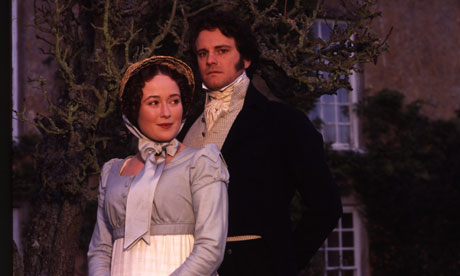by Katie Husselby
Today is the 200th anniversary of Jane Austen’s most famous novel, Pride and Prejudice, which has led me to question how this novel has managed to maintain such a lasting popularity, where so many other romantic tales have failed to stand the test of time. If one were to look at the plot alone, it would seem to reveal nothing unique or previously unimagined in its formation. So what in particular about Austen’s writing continuously captivates such a varied audience two hundred years on from its publication?
 |
| Lizzie Bennet and Mr Darcy (BBC version, 1995) (source: The Guardian) |
From the first sentence, Austen establishes a new depth to the novel, by taking a “universally acknowledged” societal expectation and examining its effect on a single family. Thus, the story is immediately broadened from an individual and private experience to an application and example of the perils and restraints of our civilisation. The experiences, loves and marriages of the daughters of a clergyman, which the reader may at first see as trivial and ridiculous through Austen’s ironic portrayal of Mrs Bennet, are in fact revealed as the hinge on which early 19th century society turns. Our first impression of the book as a predictable love story have been suitably adapted by the recognition that it contains a daring critique of wider social issues that still affect us even today.
In addition, Austen displays a surprising humour throughout the story, which increases its allure to different readers. The intelligent wit serves to undermine and satirize the experiences of the lovers (for example “To be fond of dancing was a certain step towards falling in love” and “A lady's imagination is very rapid; it jumps from admiration to love, from love to matrimony in a moment”), showing how the reader is kept in reality, increasing the authenticity of the story, rather than depicting it as a fairytale, unattainable romance. Austen’s forceful honesty and humour also brings the reader closer to the author’s consciousness, showing us the strength of Austen’s writing in a time when the position of the novel was disputed, and writing that included the thoughts and feelings of the characters not respected.
 |
| Bollywood version, 2004 (source: onlinehindimovie.net) |
In conclusion, I think it would be impossible to pin down one particular feature of the novel that causes it to thrive even today, but Austen’s minute attention to detail, regarding the characters or the society in which they are set, along with her ironic, frank and energetic writing style, seem to provide a winning combination that appeals to people of all classes and generations. It is my belief that, another two hundred years from now, readers will still be enjoying the story of personal pride and prejudices overcome and marvelling at the simplistic hilarity of Austen’s writing.
Some other responses I received to the question, “What is the enduring appeal of Pride and Prejudice?”:
“I think Pride and Prejudice remains popular because of the clever characterization used and the humour with which she writes the story. I also like the parallels between the novel and Austen’s life, which allows her to give a more personal narrative.”
“The portrayal of Austen’s characters is so human and genuine that we are still able to relate to them 200 years on. They go through the same everyday traumas that we suffer, dealing with love and disputes and familial problems in the same way as we do.”
“Pride and Prejudice is still appealing because, no matter how many times we read the story, each re-reading provides a new interpretation or view that we had not previously noticed, or a humorous take on a societal boundary that is still in place today!”
Comments
Post a Comment
Comments with names are more likely to be published.